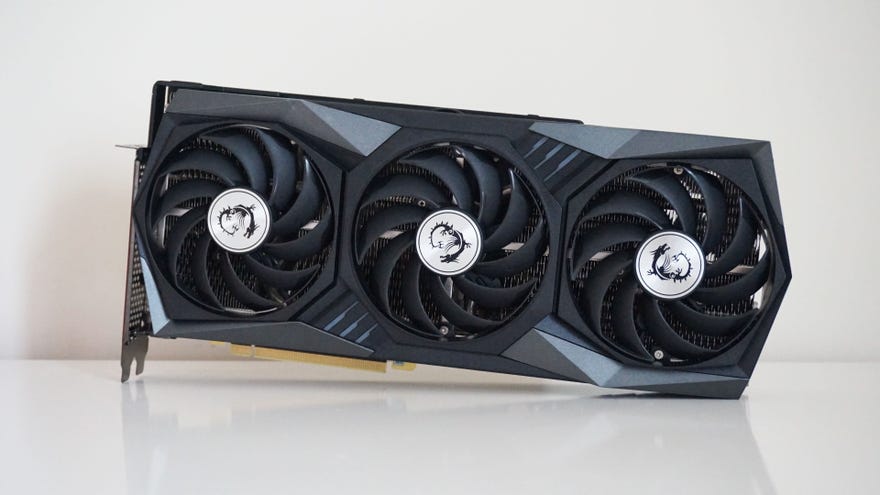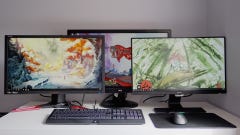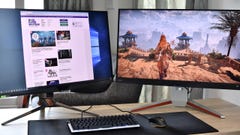Nvidia GeForce RTX 3060 review
Get double the performance of the GTX 1060
With the arrival of Nvidia's GeForce RTX 3060, we're finally getting into the realms where the next generation of graphics performance becomes vaguely affordable. While its starting price of £299 / $329 isn't quite as wallet-friendly as the popular GTX 1060 it's intending to replace (which launched for $249 back in the heady days of 2016), it's still a more appealing choice for those looking to play games at 1920x1080 and 2560x1440 than the £369 / $399 RTX 3060 Ti and the £469 / $499 RTX 3070. Its generous 12GB of GDDR6 VRAM gives it plenty of headroom to deal with future high-end quality settings, for example, and its less-demanding power requirements mean you can still get away with using a pretty standard 550W power supply with it, which can't be said of its more expensive siblings.
As there's no Nvidia Founders Edition of the RTX 3060, I've been testing MSI's GeForce RTX 3060 Gaming X Trio for the purposes of this review, which is one of the largest and fastest versions of this particular card. Whereas Nvidia's reference spec for the RTX 3060 has a boost clock speed of 1.78GHz, for example, MSI have overclocked this to an even nippier 1.85GHz. As such, my benchmark figures below are likely to be more of a best case scenario for RTX 3060 GPUs, and may be a touch faster than other kinds of cards out there.
Like the Gaming X Trio versions of MSI's higher-end RTX 30 cards, their RTX 3060 variant is a bit of a beast in terms of size and weight, and you'll need to check that you've got enough room in your case to actually fit it in. Indeed, if I hadn't already removed some of my case's HDD bay cages to test some of MSI's other Gaming X Trio cards over the past few months, I definitely would have been forced to do so here, because this thing is pretty damn long, measuring 323x140x56mm. Its extra length also brings with it extra weight, too, and you'll find a support bracket included in the box. It's pretty cumbersome, and will almost certainly block off some other PCIe ports on your motherboard, but I'd strongly recommend installing it in your case, as the farthest end does bend downwards slightly without it due to its excessive bulk of 1.4kg.
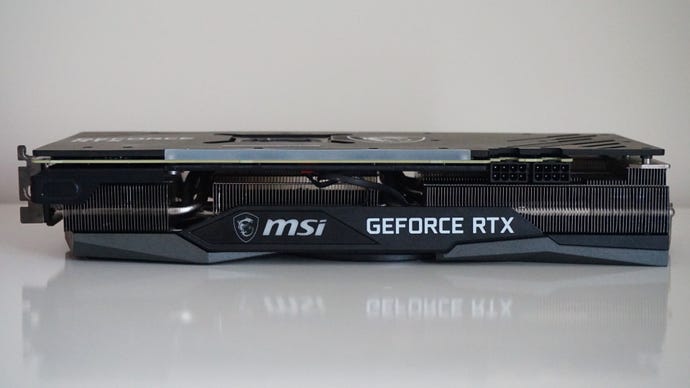
RTX 3060 performance: 1080p benchmarks
Still, in terms of performance, the MSI RTX 3060 Gaming X Trio puts in a pretty good showing. Like the RTX 3060 Ti before it, this card is more than capable of hitting well over 60fps on max settings at 1920x1080 in most of today's big games, often exceeding averages of 70, if not 80fps in games from the past couple of years. There are still a few of the very latest games from the back-end of last year that require a few quality settings tweaks, but even here you're still looking at a smooth 60fps on High most of the time. The RTX 3060 can also run at a steady 60fps on High settings at 2560x1440 in most games, too, although again, those more demanding titles out there may require you to drop down to Medium to maintain a good frame rate. But more on that in a moment.
Starting with its 1080p performance, the RTX 3060 managed a super smooth average of 84fps in Shadow Of The Tomb Raider on Highest with its tough SMAA x4 anti-aliasing enabled, which is a good 20fps in front of my RTX 2060 result, and pretty much double what you'll get on a GTX 1060, too. It even managed an impressive 56fps average with its ultra ray traced shadows enabled, producing a much smoother experience than the juddering 39fps average of the RTX 2060.
The RTX 3060 also put in a good showing in Final Fantasy XV, averaging 85fps on Highest (albeit without any of Nvidia's special extra effects enabled). Admittedly the RTX 2060 was already capable of averaging 65fps with these settings at 1080p, but that extra 20fps does at least give you a lot more headroom to start adding in those extra effects like HairWorks and TurfEffects without dropping below that all-important 60fps mark. The GTX 1060, meanwhile, can only just about hit an average of 52fps on Highest, and the only way to surpass 60fps with this card is by dropping down to Average quality.
The RTX 3060 also rinsed through demanding games such as Total War: Three Kingdoms at 1080p, finishing Creative Assembly's internal battle benchmark with an average of 70fps on Ultra settings. That's not quite double the 38fps average I saw on my GTX 1060, admittedly, but it's pretty darn close. It was a similar picture over in Monster Hunter: World, too, where I saw an average of 79fps on Highest as I ran through the dense undergrowth of its opening Ancient Forest environment, which is a considerable improvement on 40fps average of the GTX 1060.
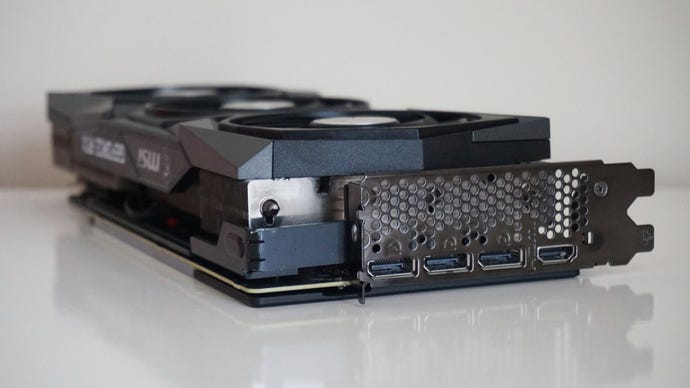
In truth, you're not gaining much over the RTX 2060 in these particular games, as its Total War: Three Kingdoms benchmark was pretty much identical to its 20-series predecessor, while its Monster Hunter: World average was just 9fps ahead. There was a similar margin separating the two RTX cards in Metro Exodus, too, although here the difference was more palpable, as the RTX 3060 finished its tough benchmark test with an average of 63fps on Ultra settings, up from the RTX 2060's slightly jerkier 52fps. The RTX 3060 also maintained its performance lead on the GTX 1060, too, which averaged just 34fps with the same settings.
Alas, the RTX 3060's ray tracing performance in Metro Exodus wasn't quite as awe-inspiring as it was in Shadow Of The Tomb Raider. Again, every frame counts when you're running below 60fps, but when the RTX 2060 can manage a decent average of 50fps with High RT settings on Ultra quality settings, I'm not sure the RTX 3060's slightly higher average of 55fps is really going to appear all that different in practice - especially when you don't have the option of enabling DLSS at 1080p to help boost its performance here.
Of course, the real test of any new graphics card is how it handles the very latest games, and I found there are still a few big blockbuster titles from the end of last year that knocked the RTX 3060 off its perfect 60fps max settings throne. Their respective averages still get pretty close, truth be told, but if it's a consistent 60fps you're after then you're definitely looking at dropping the quality settings down a couple of notches.
Assassin's Creed Valhalla still produced an admirable 59fps average on its top Ultra High setting, for example, but it also had some juddering lows of 41fps in its internal benchmarking tool. Very High was a touch better, averaging 63fps with lows of 46fps, but High was arguably where it was most comfortable. Here, it averaged a smoother 67fps with slightly less noticeable lows of 48fps. Again, all three scores are infinitely better than the 40-50fps speeds you'll get with a GTX 1060, but if you're after a card that can do 60fps on max settings no matter what, then you should probably look to the RTX 3060 Ti instead, which managed an average of 71fps on Ultra High straight off the bat.
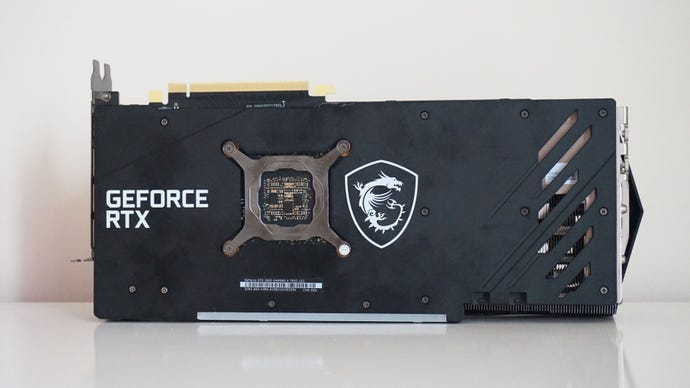
The same goes for Watch Dogs Legion. The RTX 3060 just about scraped an average of 60fps on Ultra settings at 1080p, but dropping down to Very High instantly produced a much smoother average of 82fps, giving you more headroom for switching on its various ray tracing settings. Admittedly, I still only saw an average of 51fps with Medium ray tracing settings enabled on Very High, but at least you do actually get the benefit of DLSS here, which bumped up my average frame rate to a much more playable 70fps.
Unsurprisingly, Cyberpunk 2077 proved the toughest match for the RTX 3060, although I was still pleased to see an average of 58fps on its top Ultra preset. Enabling DLSS will boost that to a similar 70fps mark as Watch Dogs Legion, too, but you'll likely have to do a fair bit of tweaking if you want to take advantage of the game's ray tracing settings as well here, as even the game's RT Medium preset only just about managed an average of 52fps. RT Ultra, meanwhile, produced a stilted average of just 44fps. In fairness, spending more on the RTX 3060 Ti doesn't really buy you many more frames in this particular instance, as even this only managed an average of 50fps on RT Ultra, and a near-identical 53fps on RT Medium.
RTX 3060 performance: 1440p benchmarks
For the most part, though, the RTX 3060 still offers plenty of speed for those after a do-it-all 1080p graphics card, and it also makes a pretty good fist of playing games at 2560x1440 as well. In most cases, I saw a consistent 60fps on High settings at this resolution, and there were even a couple that ran perfectly smoothly on their top quality settings as well.
"The RTX 3060 is certainly the next-gen card that makes the most amount of sense for 1080p monitor owners right now."
Shadow Of The Tomb Raider, for example, ran at a beautiful 80fps on Highest with its regular SMAA anti-aliasing setting enabled at 1440p, and I was also pleased to see an average of 57fps with its ultra ray tracing settings enabled along with DLSS, as this simply wasn't feasible on the RTX 2060. Final Fantasy XV, meanwhile, ran at a good clip at an average of 63fps on Highest without any of Nvidia's extra effects turned on, and even Monster Hunter: World produced a decent average of 54fps on Highest (which can easily be bumped up to 73fps by switching on DLSS).
Ultra was admittedly a bit of a stretch in Total War: Three Kingdoms, but an average of 65fps on High is still an excellent result regardless. The same goes for Metro Exodus, which averaged a respectable 63fps on High at 1440p - although if it's ray tracing you're after, then you'll probably have to drop down to Normal quality settings and enabled DLSS here, as I only saw an average of 53fps on High quality when I chucked its high ray tracing and DLSS settings into the mix. On Normal, however, that figure rose to a much smoother average of 59fps.
Of course, the games that gave the RTX 3060 the most trouble at 1080p naturally put quite the strain on it at 1440p as well, with many forcing a drop down to Medium settings in order to maintain that all-important frame rate of 60fps. Watch Dogs Legion still managed a smooth 71fps average on High, admittedly (and a very agreeable 64fps average with ultra ray tracing and DLSS switched on as well), but as much as Assassin's Creed Valhalla is probably just about doable on High at an average of 54fps, its average of 64fps on Medium felt much better moment to moment.
Cyberpunk 2077 is also best played on Medium at 1440p, averaging 55fps in the crowded streets outside V's apartment. Luckily, you do get the option of switching on DLSS here to help bump up the frame rate a bit, and I recorded an average of 65fps on High, and 61fps on Ultra. You'll likely want to stick to 1080p for playing the game with ray tracing switched on, though, as even its RT Medium preset (which has DLSS switched by default) only managed a very juddery average of 45fps here.
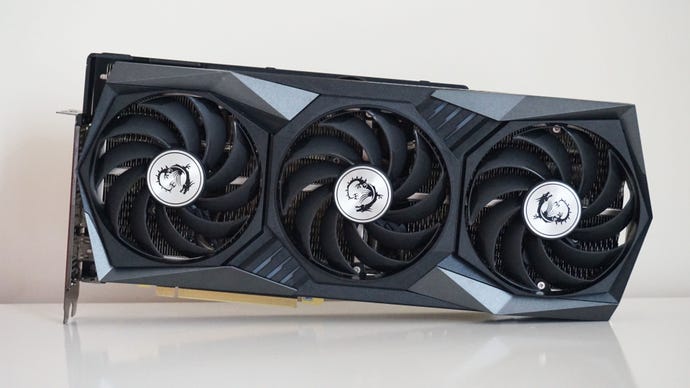
Should I buy an RTX 3060?
Overall, the RTX 3060 is a highly capable graphics card for those after a top notch 1080p experience, delivering 70-80fps frame rates in nearly all of today's biggest games as well as pretty much bang on 60fps speeds in the most demanding games from the end of 2020. It's certainly the next-gen card that makes the most amount of sense for people with 1920x1080 monitors at the moment, although we still don't know if Nvidia are planning to release any more lower-end RTX cards this year, nor do we know what to expect from AMD's lower-end RX 6000 GPUs yet. As such, it's possible there may be an even better, more affordable next-gen GPU just around the corner for 1080p gamers - although given how likely it is that the RTX 3060 will instantly sell out when it comes on sale later today (9am PT / 5pm GMT, in case you need a reminder), this problem may well resolve itself by the time we're actually able to buy one again.
For now, though, this is certainly the best value next-gen graphics card for 1080p gamers, and it's also a good budget option for those after a 1440p capable graphics card as well. Admittedly, if 1440p is your main gaming resolution, then I'd probably urge you to consider getting the more powerful RTX 3060 Ti instead when it eventually comes back in stock, as I'm not convinced the RTX 3060 will remain a particularly viable 1440p card in the years to come if you're the sort of person who likes to play the latest games as soon as they come out.
If you tend to wait a few years before playing the latest blockbusters or aren't fussed about playing them at the best settings, then by all means have at it. As you've seen from how it performs with the likes of Tomb Raider, Final Fantasy XV and Total War: Three Kingdoms, the RTX 3060 still has more than enough juice to play these demanding games from the last couple of years, and has buckets of power available for even older games, too.
I'd also say the RTX 3060 is worth considering if you've currently got a 1080p monitor and are thinking about upgrading to a 1440p one in the future, too, as it will likely still provide a decent (if not completely stellar) 1440p experience to tide you over until your next GPU upgrade. Existing 1440p monitor owners, however, will almost certainly be better off with the RTX 3060 Ti, or even the RTX 3070 depending on whether your monitor's got a high refresh rate - and you can see exactly how those cards stack up at 1440p in my RTX 3060 Ti vs RTX 3070 comparison piece.
Of course, it probably goes without saying that if you are planning on trying to get an RTX 3060 today, then you'll need to be quick, as they're likely to go like hot cakes when orders open at 9am PT / 5pm GMT. To make sure you get in there first, make sure you hop on over to our dedicated guide on where you can buy an RTX 3060 pronto.
